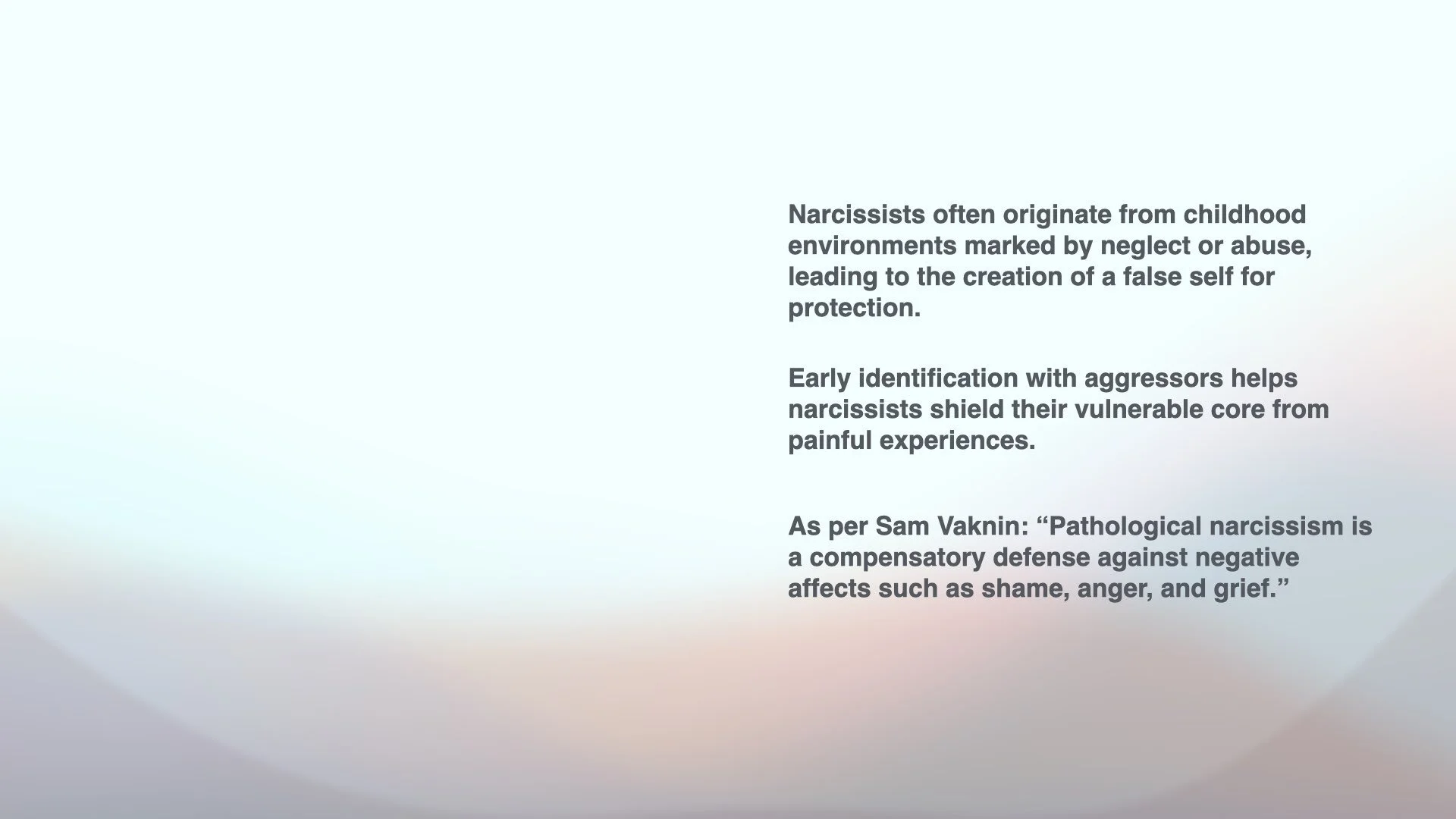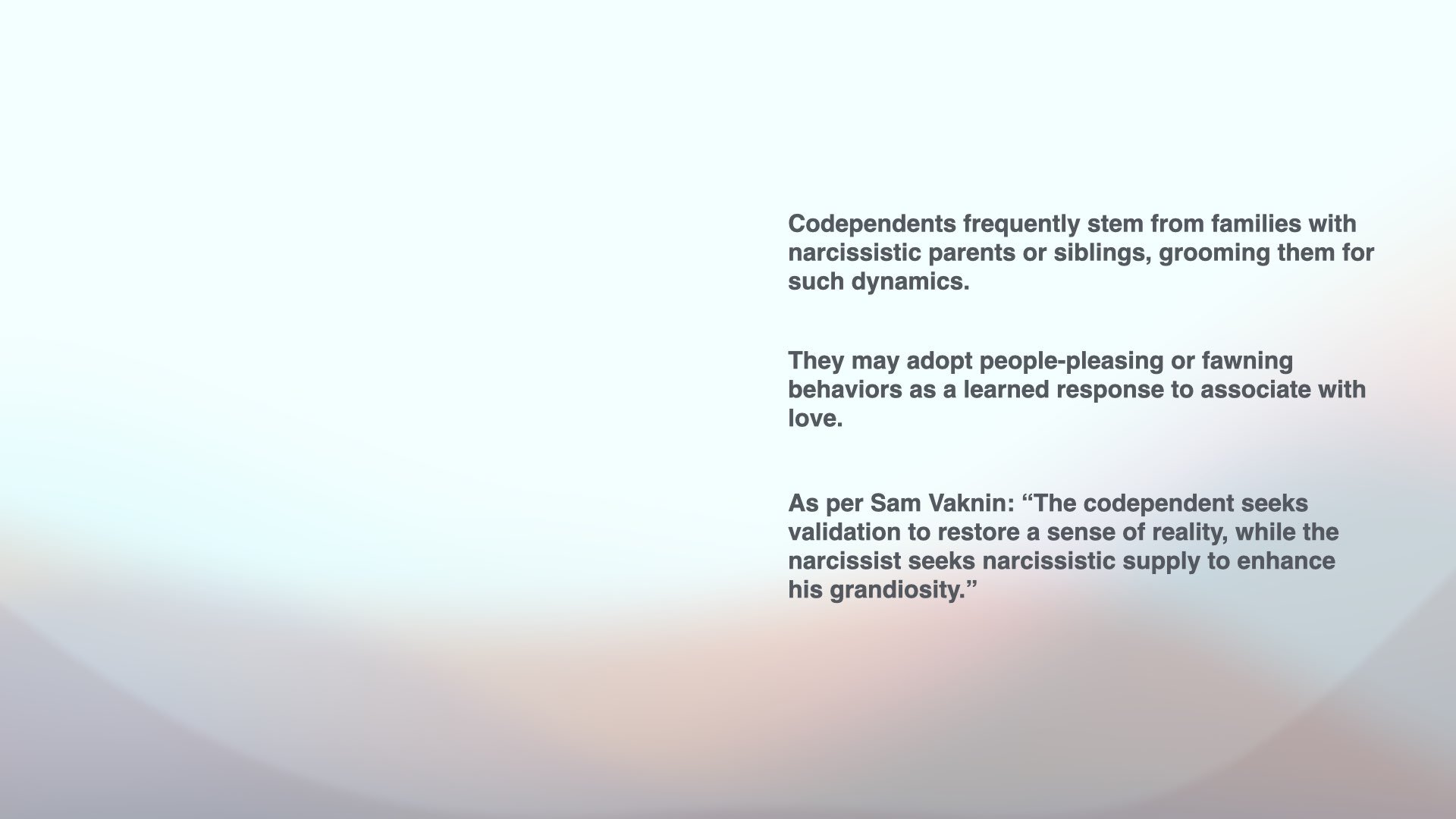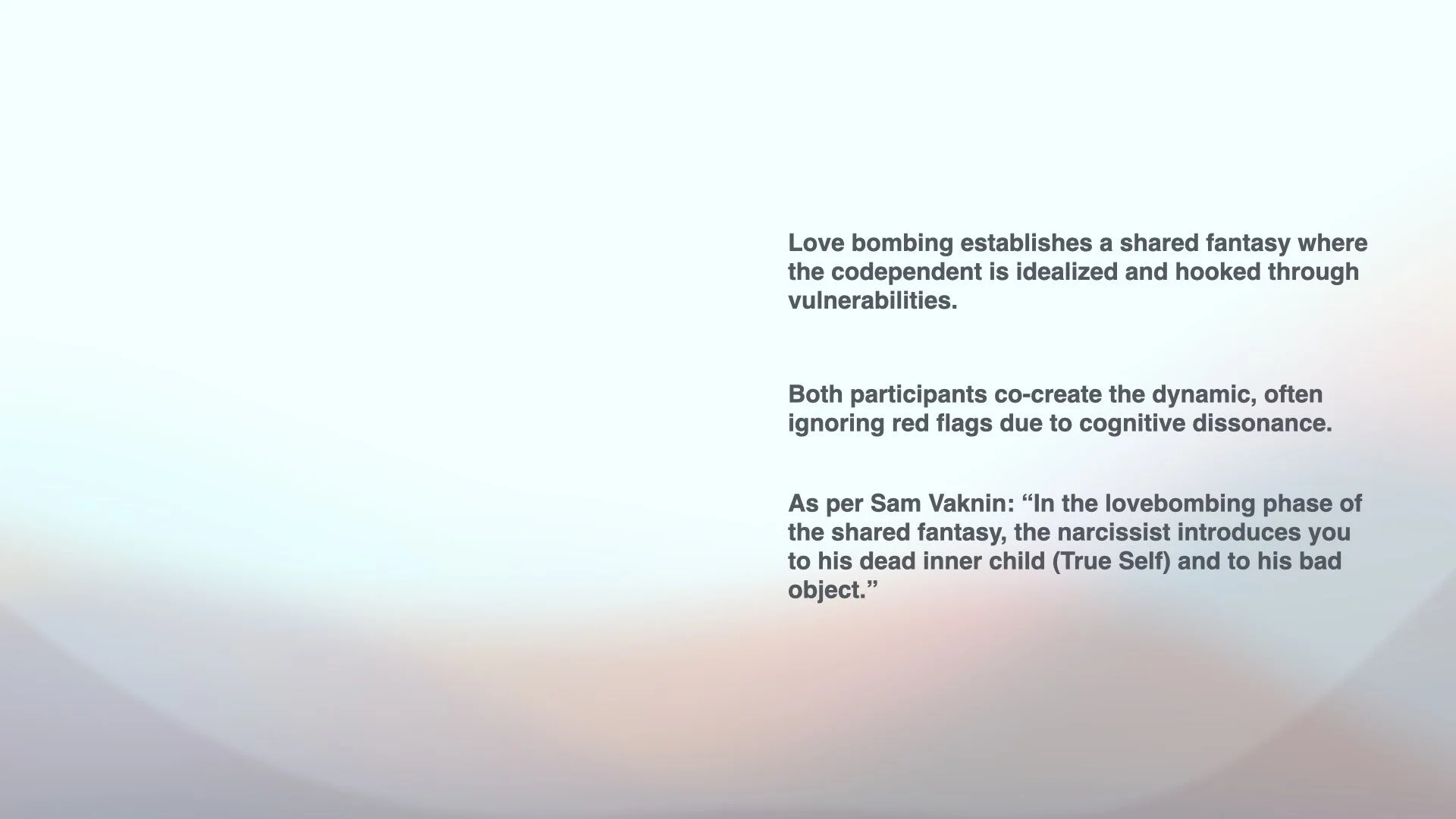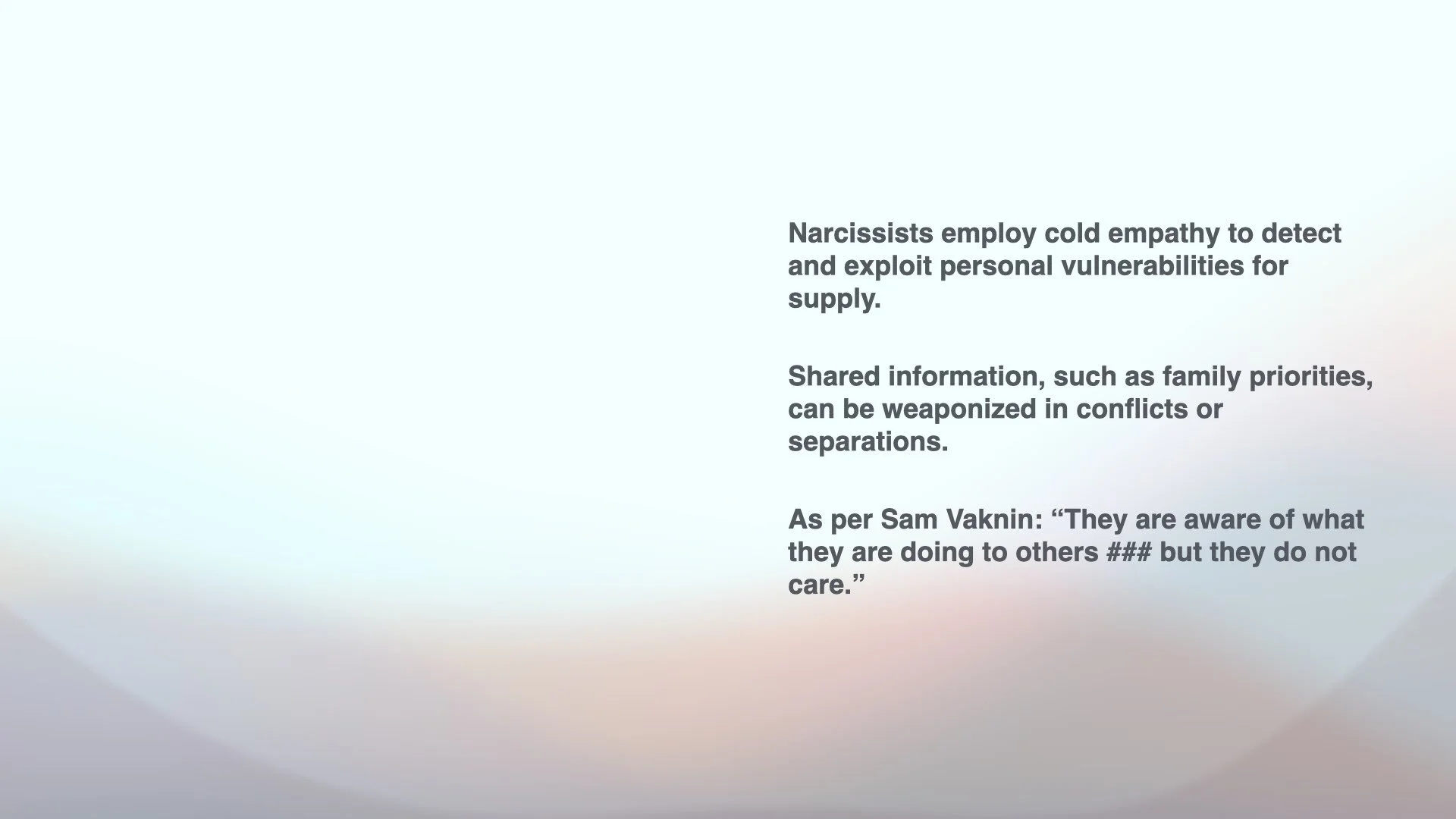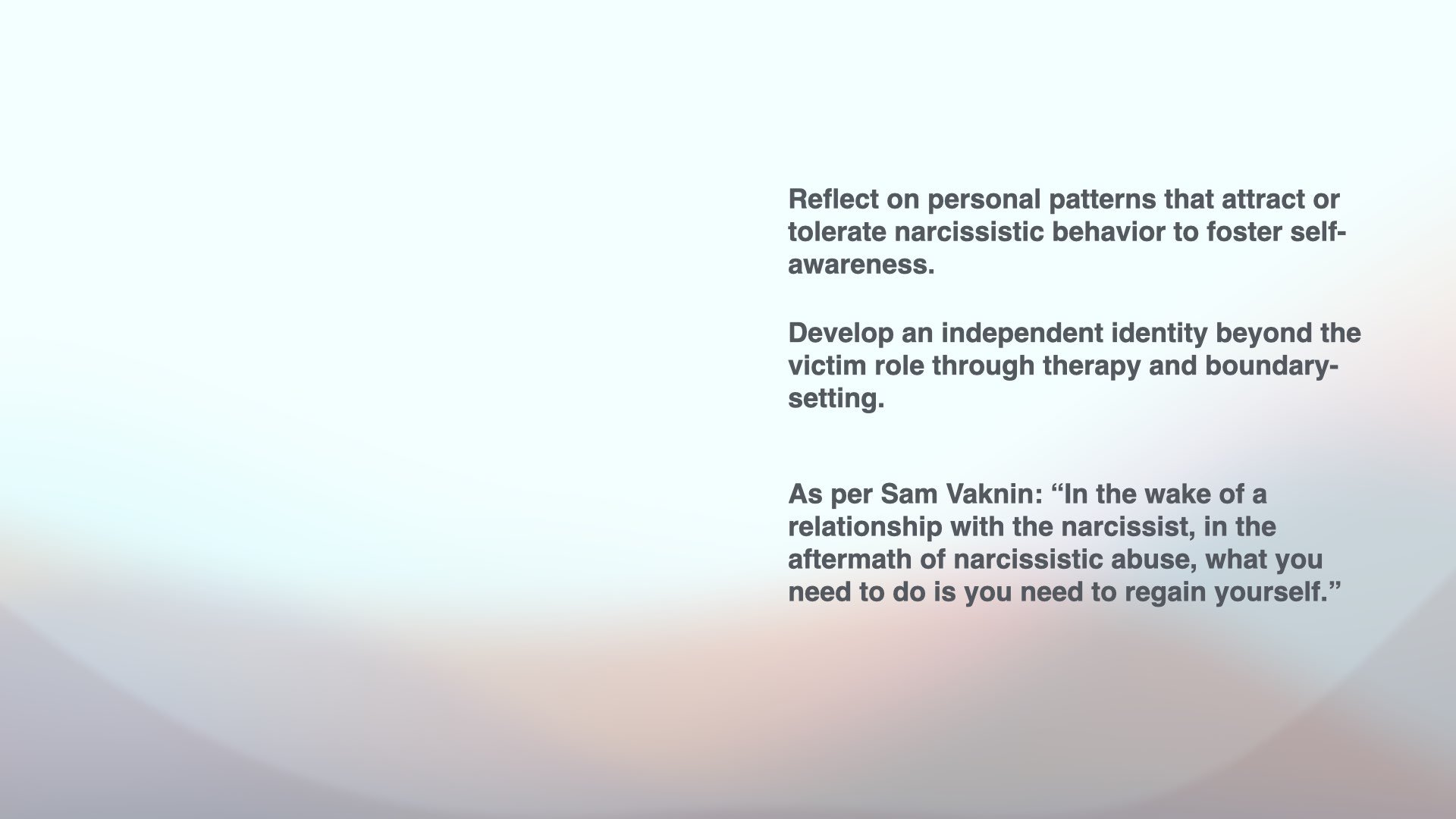Narcissists as Victims: Codependency, Shared Fantasy, and Empowerment in Romantic Relationships
The Narcissist as a Victim of Childhood Trauma
You can understand that for the narcissist, from childhood, they became like this because of probably being a victim of some sort of either neglect or abuse. This isn't to excuse or justify their behavior, but to know these people had to create a false self in order to protect the vulnerable part of themselves, likely because their environment was too painful. They started to identify with the aggressor. So from a young age, they identified with being the aggressor, but at the core, they're in some sense a victim of circumstances of their childhood and upbringing.
The Codependent's Role and Shared Victimhood
It's also to know, though, the target or the victim within romantic situations could be considered more the codependent, who is in some sense also a victim. I think there's a lot of literature and people that want to see the narcissist as only the aggressor and the victim as only the victim. And I think obviously the codependent or victim has more resources and more capacity to take ownership and responsibility and is the one that can change ultimately, as a narcissist—they're not a fully formed self. They can't change. They could modify some behavior, but for the most part, they can't change.
For the person who's been the target within a romantic situation, it's probably the case that they were, and it's likely they grew up with narcissistic parents or a sibling, exposed from an early age to being groomed or used to this behavior. This is why I think the overemphasis on externalizing the narcissist—in the sense that you were just a victim of it, or that you were just a helpless victim—is the wrong way to look at it. Of course, the mistreatment and abuse was wrong and is never justified, and the narcissist should be held accountable for that.
Co-Creating the Dynamic and the Shared Fantasy
But at the same time, if you've left, or even if you've stayed in the dynamic in some sense—especially if you stay in the dynamic—you are co-creating the situation with the narcissist. And this can go to the notion and to the concept of the shared fantasy. As when you've met the narcissist, in the early stages, it's likely that you were love bombed and through the idealization phase, you are elevated and through their gaze and through their ploys and in various ways, they got their hooks into you. Basically created the shared fantasy, but you possibly, because of your past and your own vulnerabilities, attracted yourself to the situation as well and allowed it.
You probably weren't conscious it was abuse or that this person was a narcissist, but once you've woken up to the fact that you're dealing with a narcissist, then it's just understanding what part did you play in attracting this person and putting up with this behavior? I've had some people, and there's people online, right? They'll talk about being an empath. We went through all these, let's say we went for 10, 15 years with somebody and went through all these ups and downs, but a lot of it was horrific in some sense, right? And we want there to be meaning, want there to be understanding of the narcissist choosing us.
Cold Empathy, Mirroring, and Exploitation
Narcissists can take an inventory of us. And so in some sense, there's cold empathy. So they really tend to, they're able to pick up nuances out of ourselves. But this isn't from a place of them caring about us or having genuine interest in the sense that concerned about our own wellbeing necessarily, but more to do with getting their narcissistic supply from us.
I came across a woman who had a cringe. She talked a lot about mirroring. And she felt like a lot of it was genuine. So it's, it could be the case. You meet somebody and even if they're a narcissist, you can still have shared interest. So she didn't think there was a lot of mirroring. She didn't think he was putting on an act, but he was very charming to her and they were in this love bomb honeymoon phase. It developed quickly. They were going on trips in the first month or two, and I think they moved in with each other like after three months or so. And they were talking about marriage. After six months, the relationship lasts in six months.
The narcissist will use cold empathy, get their claws into you in some sense, and then they will exploit your vulnerabilities and what you find important in your life. And this is why also too, like when people have had kids with a narcissist and are going through a divorce, the narcissist will pick up on those vulnerabilities. They can use the children and try to maybe alienate the children from the codependent or the person on the receiving end. And this can be incredibly hard because obviously that's very important to that person and so they weaponize usually and exploit what you vulnerable, things you told them or what they know about you, they'll use that against you, which is sad.
Intentionality in Manipulation and Gaslighting
Knowing that, I guess is powerful because at least you know your vulnerabilities and you can understand why and what they're doing in terms of trying to manipulate. Although according to Sam Vaknin (insights on narcissistic manipulation), they don't intentionally manipulate. It's who they are. They don't necessarily gaslight either. It's just the sense of who they are. On the receiving end, it's definitely experienced as gaslighting and manipulation, but it's more about their own personality and disorder.
Empowering Yourself Beyond Victimhood
It's really about empowering you on the receiving end of this dynamic because you don't want to spend your whole life being a victim of the narcissist. You want to have your identity outside or independent of the narcissist. I think it does take some time though, 'cause there's notion of prolonged grief in the early stages of a breakup or discard phase. Then certainly like a therapist or a friend telling you just you're not a victim would be hard to hear. And I don't think to say accurate per se.
But when it's been several years or you've continued to repeat this pattern in your life, you have to come to terms with what's in me that puts up with this behavior or attracts the situation. Both the narcissist and the codependent are victims, so the narcissist chooses the aggressor, so they're like, I'm never going to be taken advantage of again. The codependent will be a people pleaser and to appease and to fawn for people, just because that's typically what they've known or what they associate with love or with what it means to be in a caring, loving relationship.
But that's built off of a faulty foundation as well. So it's in the sense that it's not the case that the narcissist is the aggressor and that you're the victim of the aggressor. Of course they are the ones who have done the bad behavior and the abuse and neglect. In the early stages, that's perhaps not something you're conscious of, though. Maybe you've seen red flags. Usually you want a family or a relationship. You have cognitive dissonance and don't want to see these red flags. You justify or rationalize them.
Once you've broken up with a narcissist or they've discarded you, there's usually some self-reflection of past actions and what they said and did to you and how you ignored. But yeah, it's just to know that, to empower yourself, that you just understanding why you got attracted to the situation, why you put up with this, and how you participated in the shared fantasy.
If these insights into narcissistic relationships, codependency, and recovery resonate with you, consider how reflecting on your role can lead to greater empowerment. For comprehensive support, download the Reports for The Scapegoat & Narcissistic Abuse Recovery Course + 45pg Healing Toolkit here: https://blaketherapy.ca/the-ultimate-toolkit.




